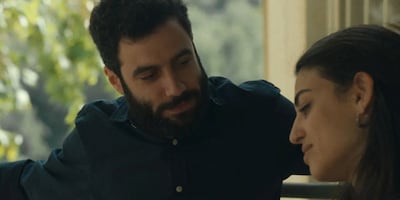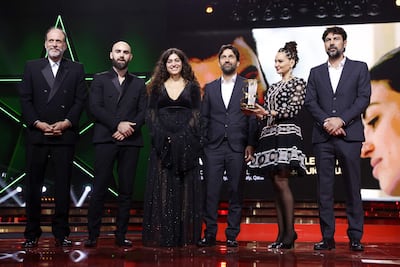In 2018, Manar Shehab signed up for an acting workshop in Haifa that was led by Palestinian Oscar-nominated director Scandar Copti. Little did she know the workshop would mark the beginning of her involvement in a film that would become a festival favourite.
Happy Holidays premiered at the Venice Film Festival in September, winning the Orizzonti award for best screenplay. More recently, the film was awarded the coveted Golden Star for best film at the Marrakech International Film Festival. Shehab herself was awarded the best actress award, a prize she shared with her co-star Wafaa Aoun.
At its core, Happy Holidays is a family drama that offers a glimpse into Palestinian life in Haifa. It begins during the Jewish holiday Purim, when Fifi (Shehab) is involved in a car accident, kicking off a series of events that has her confront secrets that she fears will risk her family’s reputation. Her brother Rami (Toufic Danial) is, meanwhile, trying to deal with his Jewish girlfriend Shirley’s ambivalence about getting an abortion. For Shirley (Shani Dahari), this means having to face familial scorn of having a baby with Arab roots. All this while Fifi and Rami’s parents, played by Imad Hourani and Aoun, are trying to navigate through significant financial pressures.
These disparate storylines neatly come together towards the end, highlighting tensions between different generations, genders and cultures. The film has been praised for its ambition and authenticity, featuring a cast comprised of non-professional actors.

Of course, Shehab did not have any idea of the film’s story when she first took part in the workshop in 2018. She didn’t even really know she would be involved in Copti’s film until more than a year later.
“I actually found out about the workshop from social media, through Instagram,” she tells The National, on the sidelines of the Marrakech International Film Festival. “I just decided to go. I had nothing to lose. We worked intensely for about two months in the summer. He worked with us on improv. I didn’t know anything about the film, nothing about the character for which he had in mind for me. I just knew that there was maybe going to be a film, and maybe I could have a role in it. That was about it.”
Towards the end of 2019, when Shehab had begun to think of the workshop as nothing but an interesting summer experience, she received a phone call from Copti.
“I had completely forgotten about the film and the workshops,” she says. “He spoke to me, and he said he wanted me for this role in the film. He just briefly explained the role, like not giving me much information. I was interested in the prospect of doing it, but I was also at the same time, very nervous and very anxious about it, because I had been disconnected from it for like a year and a half.”
Shehab says she found Fifi intriguing from the beginning for various reasons. For one thing, as a kindergarten teacher in Haifa, she often has to come face-to-face with the anti-Arab sentiments that Israeli children are brought up with.
“Fifi is kind of a minority within a minority,” Shehab says. “She's a Palestinian living in the 1948 territories. And then after that, you have Fifi as a woman living within an Arab society. That is something that I completely relate to, because it's something that I go through myself.

“The struggle to be herself and to engage with the world the way that she sees fit, that was the thing that drew me the most, because it stems from a place of a deep sentiment of pain and feeling the need to have to hide and lead an underground life. You have the standard life, the one that you live in front of your family and the one that's known in public, and then you have, like this other side of Fifi.”
Shehab says that interestingly enough, she never saw the script for the film, and came to find out the plot in the next few years during filming, a process that was hamstrung by the Covid-19 pandemic.
The script was kept under wraps from the entire cast, a directorial decision that perhaps augmented the film’s level of authenticity. “I never read any script,” Shehab says. “No one knew anything about a script. And we basically didn't know anything that was about to happen. We were just like constantly being bombarded with like, surprises and conflicts. My reactions, and I think everyone else's reactions were very much authentic, like we were living it. We weren't acting it. We weren't faking it. All the emotions that were provoked, they just came out very naturally, because that’s how Scandar wanted it.”
As Israel’s war on Gaza rages on, Shehab says the film imparts an important message related to the conflict, namely in the way it highlights experiences of Palestinians living under Israeli occupation.

“The film was shot before the genocide started in Gaza in October,” she says. “But still the film has a lot of relevance. There are these attempts to try and divide Palestinian society. You have Palestinians in Gaza, Palestinians in the West Bank, and you have the 1948 Palestinians. A lot of the attempts that are being made are just trying to divide us and to make us feel like we're not connected to one another.
"It's really important to have a film that kind of portrays the 1948 Palestinian society, because not a lot of people know about this. A lot of people also know about this, but they have their misconceptions, and prejudice about the Palestinians living on the inside.”
The film’s international reach is also an important aspect to consider, Shehab says. “To have a Palestinian film entering the festival in Venice, it’s been to Germany, to Toronto, to Croatia, and coming now to the Arab world, to have this kind of exposure, to have a conversation being started about Palestine, that is super important.”
Shehab, who is a clinical psychologist working in Haifa, says she is not sure whether she will pursue a career in acting. She is not ruling out the chance, even if she is certain that her experience with Copti cannot be repeated.
“I have my patients, and I work in a clinic and that's my main line of work,” she says. “Coming to this experience of acting was completely coincidental. I enjoyed it very much. Maybe I will have another experience as an actress. I’m open to it."

